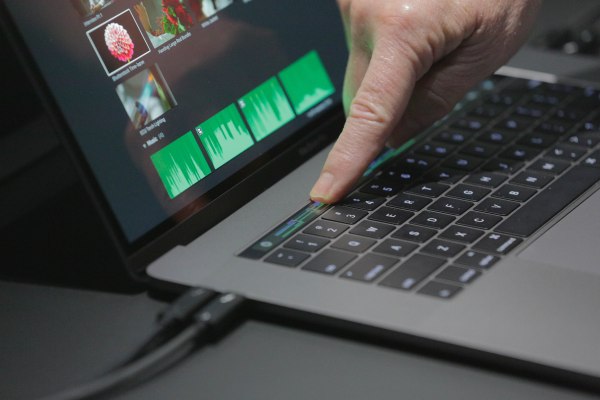Apple is already using an ARM-based chip in the latest MacBook Pro with a Touch Bar and Touch ID sensor. According to a new report from Bloomberg, the company could go one step further and use the co-processor to offload some tasks.
But first, let’s talk about the co-processor in the MacBook Pro with a Touch Bar and how it currently works. Called the T1, the chip was designed by Apple and is not that powerful.
In fact, the T1 is the same chip as the one in the Apple Watch Series 2. The Touch Bar runs a flavor of watchOS customized for very specific features. The T1 runs the Secure Enclave so you can store personal information, such as your fingerprints and your keychain, and your computer won’t ever see this information.
So when you’re using your Mac, it’s like there are two computers running and talking to each other. The main Intel processor does the heavy lifting, and the T1 handles very specific features.
But the T1 and the Intel Core i5 or i7 in your MacBook run two very different operating systems. The T1 is an ARM-based chip and can only run code that was compiled for ARM chips. The Intel chip runs x86 code. Just like on your iPhone, you can’t simply run iTunes on the T1 — it needs to be optimized for ARM processors.
According to Bloomberg’s report, Apple is thinking about expanding the tasks of the T1 with a new, more powerful chip. The updated chip could be codenamed the T310 and it won’t replace the Intel chip — it’s going to be another co-processor, but with more responsibilities.
For instance, Bloomberg says that your Mac would only use the T310 for Power Nap. Apple introduced Power Nap in 2012. This feature silently wakes your computer when it’s sleeping to sync your iCloud data, fetch your emails and calendar events, upload photos to iCloud and even perform small Time Machine backups. This way, when you use your laptop again, your computer isn’t playing catch-up.
It would take quite a lot of work to offload Power Nap to the T310. The T310 would need to connect to your Wi-Fi network thanks to an ARM-based Wi-Fi driver, load macOS services, such as iCloud syncing services and more.
Many drivers and basic OS features would need to be compiled for both the Intel chip and the ARM chip. But the good news is that Apple has already done a lot of this work for iOS. iPhones and iPads can already perform many of these tasks, and sometimes better than macOS.
For instance, in my experience, the Wi-Fi stack works much better on iOS compared to macOS. You are able to connect to a spotty Wi-Fi network and get much better performance on your iPad.
In addition to that, ARM-based chips are much more power efficient than Intel chips. By offloading some tasks to the T310, Apple would be able to get much better battery life.
But does it mean that the T310 will be able to communicate directly with the Wi-Fi module in your Mac? Does it mean that all the networking will be done by the T310 even when you’re using your Mac? That would mean that the line between the ARM-based chip and the Intel chip would get blurry, and this is when it could get interesting.
I don’t see Apple ditching Intel any time soon. Using Intel chips still makes a lot of sense. But it seems likely that all the research and development that went into creating Apple’s chips for iOS devices is going to get reused in future MacBooks.
While the Touch Bar is an interesting input device, it’s just the tip of the iceberg. Behind the scene, Apple could be preparing some major changes for the MacBook product line.
